新版PEP五年级英语下册各单元知识点总结
PEP小学英语五年级下册各单元知识重点总结
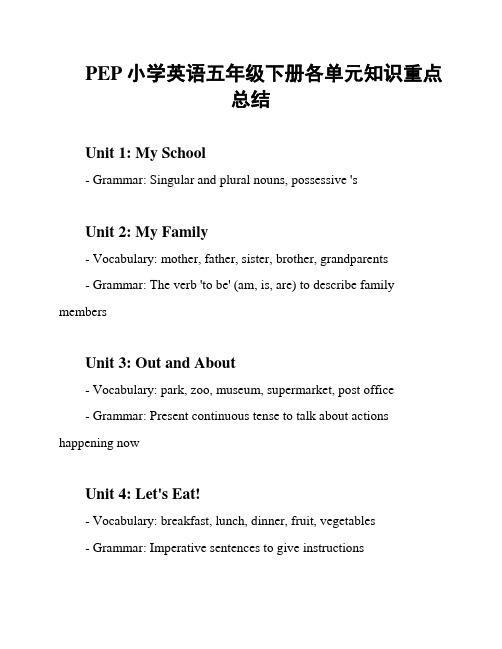
PEP小学英语五年级下册各单元知识重点总结Unit 1: My School- Grammar: Singular and plural nouns, possessive 'sUnit 2: My Family- Vocabulary: mother, father, sister, brother, grandparents- Grammar: The verb 'to be' (am, is, are) to describe family membersUnit 3: Out and About- Vocabulary: park, zoo, museum, supermarket, post office- Grammar: Present continuous tense to talk about actions happening nowUnit 4: Let's Eat!- Vocabulary: breakfast, lunch, dinner, fruit, vegetables- Grammar: Imperative sentences to give instructionsUnit 5: At the Farm- Vocabulary: farmer, barn, cow, pig, chicken- Grammar: There is/There are to talk about existenceUnit 6: Our Town- Vocabulary: street, hospital, police station, fire station, city- Grammar: Prepositions of place (in, on, under, behind, next to)Unit 7: Weather Report- Vocabulary: sunny, cloudy, rainy, snowy, windy- Grammar: Adjectives to describe weatherUnit 8: Fun with Friends- Vocabulary: play, sing, dance, swim, draw- Grammar: Simple present tense to talk about daily activitiesUnit 9: In the Ocean- Vocabulary: fish, dolphin, shark, octopus, seahorse- Grammar: Wh- questions using 'What' and 'Where'Unit 10: Happy Holidays- Vocabulary: Christmas, Easter, Halloween, New Year's Day, Thanksgiving- Grammar: Use of can for ability。
新人教版PEP 【小学五年级英语下册】 单元知识点 归纳总结

新人教版PEP 【小学五年级英语下册】单元知识点归纳总结Unit 1 My DayIn this unit。
we learn some core vocabulary words。
phrases。
and XXX.Core Vocabulary:1.Verbs: take (studying)。
go to (class)2.Nouns: dancing。
exercise。
sports3.Phrases: do morning exercises。
eat breakfast。
play sports。
eat dinner。
go for a walk。
go shopping。
clean my room。
take a dancing class。
have a classXXX Vocabulary:1.Verbs: start。
shop。
work。
need。
live。
win。
sound2.Nouns: Spain。
play。
letter。
island。
cave3.ns: after4.XXX: when。
XXX。
a.m。
p.m。
why。
last。
also。
busy5.nal Vocabulary: frequency adverbs (always。
usually。
sometimes)Phrases:watch TV。
eat lunch。
go to bed。
go swimming。
go home。
go to schoolCore Sentence Structure:When do you do morning exercises?" "At 7 o'clock."XXX phrase is "good job" to praise XXX.Which season do you like best。
I like winter best。
This sentence means "which one do you like the most" and "like。
PEP小学英语五年级下册各单元重点内容概述
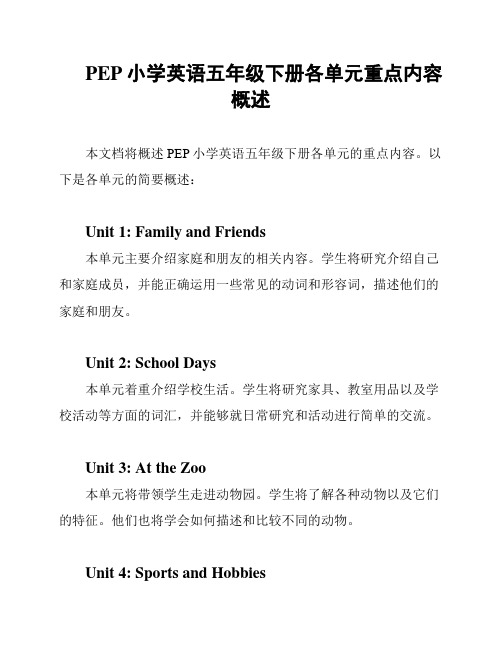
PEP小学英语五年级下册各单元重点内容概述本文档将概述PEP小学英语五年级下册各单元的重点内容。
以下是各单元的简要概述:Unit 1: Family and Friends本单元主要介绍家庭和朋友的相关内容。
学生将研究介绍自己和家庭成员,并能正确运用一些常见的动词和形容词,描述他们的家庭和朋友。
Unit 2: School Days本单元着重介绍学校生活。
学生将研究家具、教室用品以及学校活动等方面的词汇,并能够就日常研究和活动进行简单的交流。
Unit 3: At the Zoo本单元将带领学生走进动物园。
学生将了解各种动物以及它们的特征。
他们也将学会如何描述和比较不同的动物。
Unit 4: Sports and Hobbies本单元将探讨体育和爱好。
学生将研究描述不同体育运动和爱好的词汇,并能够就自己的喜好进行表达。
Unit 5: Food and Health本单元将关注食物和健康。
学生将研究各种食物的名称和描述,同时也会探讨健康和饮食惯的重要性。
Unit 6: My Neighborhood本单元将介绍学生所在的社区。
学生将研究描述自己的住所和周围环境的词汇,并能够就不同位置进行简单的指示。
Unit 7: Weather and Seasons本单元将涉及天气和季节。
学生将研究各种天气状况的词汇和描述,并了解不同季节的特点。
Unit 8: Holidays and Festivals本单元将介绍各种假期和节日。
学生将研究诸如春节、圣诞节等节日的名称和庆祝活动,并能够就个人喜好进行交流。
Unit 9: On the Farm本单元将带领学生了解农场。
学生将研究农场里各种动物和农作物的名称,并能够描述它们的特点。
Unit 10: Travel and Adventure本单元将聚焦旅行和冒险。
学生将研究描述不同交通工具以及旅行地点的词汇,并能够描述自己的旅行经历。
以上是PEP小学英语五年级下册各单元的重点内容概述。
【口袋书】人教版PEP五年级下册英语 基础知识汇总

人教版PEP五年级下册基础知识汇总Unit 1 My day.重点单词:[四会]dancing 跳舞;舞蹈exercise 活动;运动take 学习;上(课)[三会]after 在(时间)后start 开始usually 通常地;惯常地Spain 西班牙late 晚;迟a.m.午前;上午p.m.午后;下午why 为什么shop 去买东西;购物work 工作last 上一个的;刚过去的sound 听起来好像also 还;也busy 忙的need 需要play 戏剧;剧本letter 信live 居住island 岛always 总是;一直cave 山洞;洞穴win 获胜重点短语:eat breakfast 吃早饭have … class 上…课play sports 进行体育运动do morning exercises 做早操eat dinner 吃晚饭clean my room 打扫我的房间go for a walk 散步go shopping 去买东西;购物take a dancing class 上舞蹈课go swimming 去游泳start class 开始上课last night 昨天晚上after lunch 午饭以后a lot of fun 许多乐趣live on an island 住在一座岛上be good at sports 擅长体育运动字母组合cl 发/kl/ 音:clean 打扫clock 钟class 课;班级clever 聪明的clock 钟字母组合pl 发/pl/ 音:plate 盘子;碟子eggplant 茄子please 请play 玩耍;戏剧重点句型:1.询问别人什么时候做某事的问句及回答:-- When do/does + 主语+ 动词(短语)原形(+ 其他)?-- 主语(+ 频度副词)+ 动词(短语)原形/ 第三人稀单数形式+ at + 具体时间/ At + 具体时间.-- When do you get up? 你什么时候起床?-- I get up at 5 o'clock. 我5点起床。
人教版PEP小学英语五年级下册知识点汇总(最新)
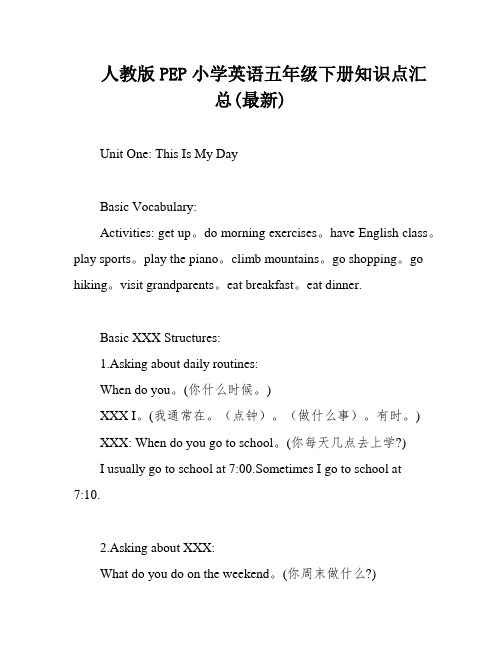
人教版PEP小学英语五年级下册知识点汇总(最新)Unit One: This Is My DayBasic Vocabulary:Activities: get up。
do morning exercises。
have English class。
play sports。
play the piano。
climb mountains。
go shopping。
go hiking。
visit grandparents。
eat breakfast。
eat dinner.Basic XXX Structures:1.Asking about daily routines:When do you。
(你什么时候。
)XXX I。
(我通常在。
(点钟)。
(做什么事)。
有时。
)XXX: When do you go to school。
(你每天几点去上学?)I usually go to school at 7:00.Sometimes I go to school at7:10.2.Asking about XXX:What do you do on the weekend。
(你周末做什么?)XXX I。
(我通常/经常。
有时。
)XXX: What do you do on the weekend?I often play XXX I go shopping with my mom.3.Introducing one's own habits:Every weekend。
I go hiking。
(我每个周末远足。
)Every day。
I do my homework at 8:00 in the evening。
(我每天晚上8点做作业。
)4.Asking XXX:What do you do。
(你是干什么的?)Time:morning。
afternoon。
evening。
noon。
at night。
6:00.on Sunday。
人教版PEP小学英语五年级下册知识点汇总(最新)
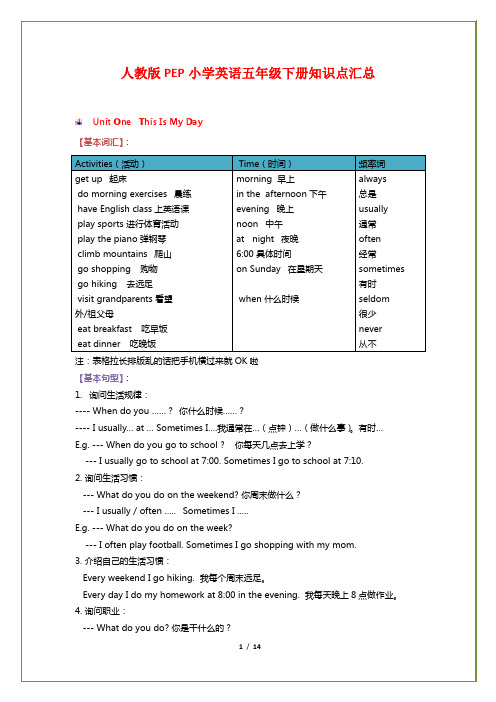
人教版PEP小学英语五年级下册知识点汇总Unit One This Is My Day【基本词汇】:Activities(活动) Time(时间)频率词get up 起床do morning exercises 晨练 have English class上英语课 play sports 进行体育活动 play the piano 弹钢琴climb mountains 爬山go shopping 购物go hiking 去远足visit grandparents 看望外/祖父母eat breakfast 吃早饭eat dinner 吃晚饭morning 早上in the afternoon下午evening 晚上noon 中午at night 夜晚6:00 具体时间on Sunday 在星期天when 什么时候always总是usually通常often经常sometimes有时seldom很少never从不注:表格拉长排版乱的话把手机横过来就OK啦【基本句型】:1. 询问生活规律:---- When do you ……?你什么时候……?---- I usually… at …Sometimes I….我通常在…(点钟)…(做什么事)。
有时…E.g. --- When do you go to school ? 你每天几点去上学?--- I usually go to school at 7:00. Sometimes I go to school at 7:10.2. 询问生活习惯:--- What do you do on the weekend? 你周末做什么?--- I usually / often ….. Sometimes I …..E.g. --- What do you do on the week?--- I often play football. Sometimes I go shopping with my mom.3. 介绍自己的生活习惯:Every weekend I go hiking. 我每个周末远足。
新人教版PEP五年级英语下册各单元知识点总结
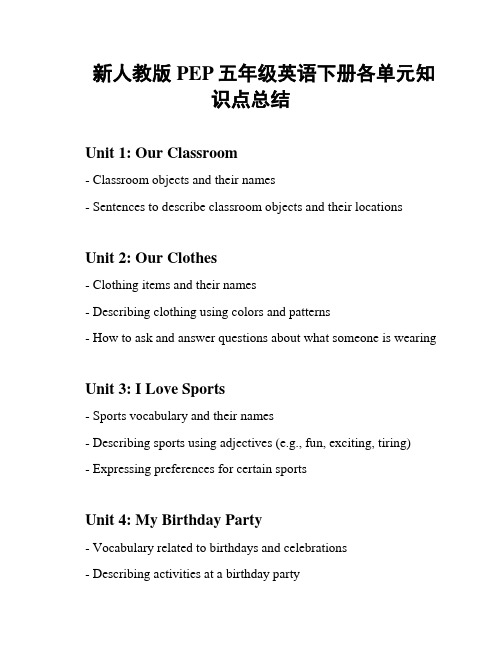
新人教版PEP五年级英语下册各单元知识点总结Unit 1: Our Classroom- Classroom objects and their names- Sentences to describe classroom objects and their locationsUnit 2: Our Clothes- Clothing items and their names- Describing clothing using colors and patterns- How to ask and answer questions about what someone is wearingUnit 3: I Love Sports- Sports vocabulary and their names- Describing sports using adjectives (e.g., fun, exciting, tiring)- Expressing preferences for certain sportsUnit 4: My Birthday Party- Vocabulary related to birthdays and celebrations- Describing activities at a birthday party- Expressing likes and dislikes about different party elementsUnit 5: At the Farm- Vocabulary related to farm animals and their names- Describing farm animals using adjectives (e.g., big, small, noisy) - Describing activities at a farm (e.g., feeding animals, milking cows)Unit 6: A Fun Day Out- Vocabulary related to amusement park rides and activities- Describing activities and experiences at an amusement park- Expressing likes and dislikes about different rides and activitiesUnit 7: A Friendly Letter- Vocabulary related to writing a letter (e.g., greeting, closing, signature)- Structure of a friendly letter- Writing a letter to a friend, describing personal experiences or activitiesUnit 8: Our Pets- Vocabulary related to pets and their names- Describing pets using adjectives (e.g., cute, friendly, playful)- Talking about responsibilities and caring for petsUnit 9: Our Earth- Vocabulary related to the environment and nature- Describing different natural elements (e.g., mountains, rivers, plants)- Expressing concerns and suggesting actions to protect the environmentUnit 10: Fun with Art- Vocabulary related to art and artistic activities- Describing different art forms (e.g., drawing, painting, sculpting) - Talking about personal preferences for different art activitiesUnit 11: Let's Travel- Vocabulary related to travel and transportation- Describing different modes of transportation (e.g., car, train, airplane)- Talking about travel experiences and preferences for different destinationsUnit 12: Healthy Habits- Vocabulary related to health and healthy habits- Describing different healthy habits (e.g., exercise, balanced diet, enough sleep)- Talking about personal choices and habits for a healthy lifestyle。
(完整)PEP小学英语五年级下册各单元知识重点归纳-推荐文档

PEP五年级下册各单元知识重点Unit 1 This Is My Day我会背:do morning exercises晨练eat breakfast吃早饭have english class上英语课play sports进行体育运动eat dinner吃晚饭when什么时候evening夜晚;晚上get up起床at在……点钟usually通常;一般noon中午climb mountains爬山go shopping购物;买东西play the piano弹钢琴visit grandparents看望祖父母go hiking去远足weekend周末often经常sometimes有时候话题: 日常生活1. When do you do morning exercises? 你什么时候做早操?.usuall.d.mornin.exercise.a.8:00......我经常八点钟做早操。
(.usuall.ge.u.a.12:0.noo........我经常在中午十二点起床。
)2. When do you eat dinner ? 你什么时候吃晚餐?.ea.dinne.a.7:0.i.th.evening........我在晚上七点钟吃晚餐。
3.Wha.d.yo.d.o.th.weeken......... 你周末做什么?.usuall.clim.mountains. 我通常去爬山. .ofte.pla.sport..我经常经行体育锻炼。
Sometime..pla.th.pian..有时候我弹钢琴。
Unit 2 My Favourite Season我会背:spring春天summer夏天fall秋天winter冬天season季节which哪一个best最;极swim游泳fly kites放风筝skate滑冰make a snowman堆雪人plant trees种树why为什么because因为sleep睡觉favourite 最喜爱的话题: 季节1. Which season do you like best ? I like spring best.(Spring.)你最喜欢是什么季节?我最喜欢春季。
完整版)人教版PEP五年级英语下册各单元知识点

完整版)人教版PEP五年级英语下册各单元知识点Unit 1 My DayIn this unit。
we will focus on the following vocabulary words:1.Four-word phrases:XXXHave classPlay sportsExerciseMorning exercisesEat XXXClean my roomGo for a walkGo shoppingXXXDancingTake a dancing class2.Three-word phrases: WhenAfterStartUsuallySpainLateAMPMWhyShopWorkLastSoundAlsoBusyNeedPlayXXXLiveIslandAlwaysCaveGo swimmingXXXXXX words。
we will also cover other daily XXX up。
eating lunch。
and going to bed。
We will also learn how to wash our face and clothes。
watch TV。
play ping-pong and the pipa。
go swimming and running。
do homework and kung fu。
and play XXX.We will also learn about frequency adverbs。
including always。
usually。
often。
and sometimes。
Finally。
we will cover the n words when and why。
and XXX we do certain activities.One XXX structure we will learn is how to ask someone when they do something and how to answer。
(完整版)新版PEP五年级下册知识点总结,推荐文档
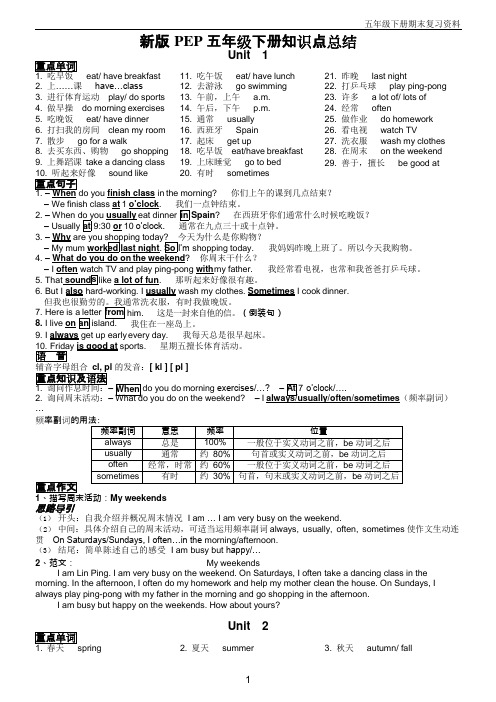
in at When 新版 PEP 五年级下册知识点总结Unit 11. 吃早饭 eat/ have breakfast2. 上……课 have…class3. 进行体育运动 play/ do sports4. 做早操 do morning exercises5. 吃晚饭 eat/ have dinner6. 打扫我的房间 clean my room7. 散步 go for a walk8. 去买东西、购物 go shopping 9. 上舞蹈课 take a dancing class 10. 听起来好像 sound like11. 吃午饭 eat/ have lunch 12. 去游泳 go swimming 13. 午前,上午 a.m. 14. 午后,下午 p.m. 15. 通常 usually 16. 西班牙 Spain 17. 起床 get up18. 吃早饭 eat/have breakfast 19. 上床睡觉 go to bed 20. 有时 sometimes21. 昨晚 last night22. 打乒乓球 play ping-pong 23. 许多 a lot of/ lots of 24. 经常 often25. 做作业 do homework 26. 看电视 watch TV27. 洗衣服 wash my clothes 28. 在周末 on the weekend 29. 善于,擅长 be good at1. – When do you finish class in the morning? 你们上午的课到几点结束? – We finish class at 1 o’clock . 我们一点钟结束。
2. – When do you usually eat dinner Spain ? 在西班牙你们通常什么时候吃晚饭? – Usually 9:30 or 10 o’clock. 通常在九点三十或十点钟。
(完整版)人教版PEP五年级下册英语知识点复习总结
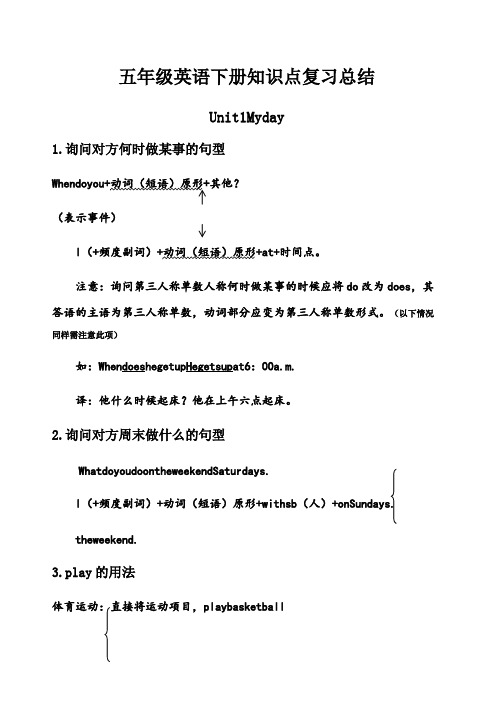
五年级英语下册知识点复习总结
Unit1Myday
1.询问对方何时做某事的句型
Whendoyou+动词(短语)原形+其他? (表示事件)
I(+频度副词)+动词(短语)原形+at+时间点。 注意:询问第三人称单数人称何时做某事的时候应将 do 改为 does,其 答语的主语为第三人称单数,动词部分应变为第三人称单数形式。(以下情况
同样需注意此项)
如:WhendoeshegetupHegetsupat6:00a.m. 译:他什么时候起床?他在上午六点起床。
2.询问对方周末做什么的句型
WhatdoyoudoontheweekendSaturdays. I(+频度副词)+动词(短语)原形+withsb(人)+onSundays. theweekend.
(2)在基数词后加 th:除去 first,second,third,其他基数词变序数词一般 直接在其后加 th。注意 five 与 twelve 要先把 ve 变 f,再加 th;eight 直接加 h;nine 去 e 再加 th。
(3)整十序数词以 ieth 结尾:整十位的序数词先将十位整数词尾的 y 变为 i, 再加 eth。如:twenty-twentieth。
The
注意:play-plays 因为 a 是元音 3)以 ch,sh,s,x 或 o 结尾的动词,在后面加-es; 例如 teach-teacheswash-washesdo-doesgo-goesfix-fixes
4)不规则的; 例如 have-has
5.by 的用法
人教版PEP五年级英语下册各单元语法点

人教版PEP五年级英语下册各单元语法点Unit 1: What Does She Do?- 一般现在时:用于描述日常活动或惯。
主语为第三人称单数时,动词加-s或-es。
- 观察寻找规律:第三人称单数的动词加-s或-es。
- Be动词+动词-ing:用于描述正在进行的动作。
主语为第三人称单数时,be动词用is。
- 一般现在时的否定句:在动词前面加don't/doesn't。
- 一般现在时的疑问句:将do/does置于主语之前。
Unit 2: Can You Run?- Can的用法:用于表示能力和询问对方是否能够做某事。
- Can的否定形式:在can后面加not或缩略形式can't。
- Can的疑问形式:将can置于句首。
Unit 3: What Are They Doing?- 现在进行时:用于描述正在进行的动作。
动词加-ing。
- 现在进行时的否定句:在be动词后面加not。
- 现在进行时的疑问句:将be动词置于句首。
Unit 4: I'm Sitting at the Front.- 介词短语表示地点:用于描述人或物所在的位置。
- 介词on、in、under、behind、in front of、next to等的用法。
Unit 5: What Are You Going to Do?- be going to的用法:表示将来要做的事情。
- be going to的否定形式:在be动词后面加not。
- be going to的疑问形式:将be动词置于句首。
Unit 6: It's Raining!- 祈使句:用于表示请求、命令或建议。
动词原形作谓语。
- 祈使句的否定形式:在动词前面加don't。
- 祈使句的疑问形式:用Do开头。
Unit 7: How Often Do You Exercise?- 表示频率的副词:用于描述动作发生的频率。
- always, usually, often, sometimes, hardly ever, never等的用法。
最新PEP人教版小学英语五年级下册单元知识清单总结(全册)
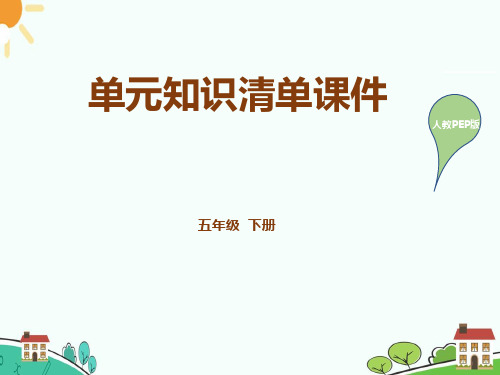
五、第八、第九、 第十二变化不规则外,其 余均在基数词后加上-th即可。 ② 20~90的序数词的构成方法是将基数词的词 尾 -y 变成i再加-eth. ③ 几十几的序数词,只需把个位数变成序数词, 十位数不变。
英语 人教PEP版 五年级下册 Unit 1
英语 人教PEP版 五年级下册 Unit 1
例如: —When does he do sports?
他什么时候做运动? —He usually plays sports after school.
他通常放学后做运动。 ☆询问时间的其他句型: What time+do/does+主语+动词原形+其他? 例如:What time do you read English?
单元知识清单课件
人教PEP版
五年级 下册
英语 人教PEP版 五年级下册 Unit 1
Unit 1 单元重难点
1.【原文呈现】 When do you finish class in the morning? 你们上午的课到几点结束? 【句型结构】 “When+助动词+sb+动词原形+其他?” 用来询问某(些)人做某事的时间。
—I usually climb mountains. 我通常爬山。
英语 人教PEP版 五年级下册 Unit 1
【情景再现】 每个人都有自己的周末安排。来看一下Mike和
Amy的周末计划吧! Mike:Hello, Amy! What do you do on the weekend? Amy:I usually play the piano. Mike:Oh, that’s good. When do you usually play
五年级下册英语pep各单元归纳总结

在五年级下册英语pep教材中,每个单元都包含了丰富的知识点和丰富的教学内容。
在这篇文章中,我将针对每个单元进行深度和广度的总结,以帮助你更好地理解和掌握这些内容。
1. 第一单元:Where did you go on vacation?在这个单元中,我们学习了关于假期和度假地点的词汇和句型。
通过学习这个单元,我们能够学会描述自己的假期经历,同时也能够对不同度假地点进行简单的介绍。
这对我们日常生活中的交流和沟通都是非常有用的。
2. 第二单元:What will you do if it rains?这个单元主要是关于天气和应对天气变化的表达方式。
我们学习了各种不同的天气词汇和与天气相关的句型。
通过这个单元的学习,我们可以更好地了解和描述不同天气情况下我们的活动安排,同时也能学会提出建议和安慰他人。
3. 第三单元:What did you do last weekend?在这个单元中,我们学习了一般过去时的用法,并通过对上周末活动的描述来练习这一时态。
通过学习这个单元,我们不仅能够更好地表达过去的活动和事件,同时也能够更好地回顾和总结自己的生活。
4. 第四单元:Could you please clean your room?这个单元主要是学习家务活动和请求的表达方式。
我们学习了关于家务活动的词汇和句型,同时也学会了礼貌地提出请求和应对请求的方式。
这对我们的生活和人际交往都非常有帮助。
5. 第五单元:How do you go to school?这个单元主要是关于交通工具和出行方式的表达。
我们学习了不同交通工具的名称和描述,同时也学会了谈论我们的出行方式和出行习惯。
这对我们日常生活中的交通和出行都是非常有帮助的。
6. 第六单元:What can you do?这个单元主要是学习自我介绍和能力表达方式。
我们学习了关于自我介绍和能力表达的词汇和句型,同时也学会了描述自己的兴趣爱好和特长。
这对我们的个人品格和人际交往都是非常有帮助的。
PEP小学英语五年级下册unit1--6单元重难点汇总
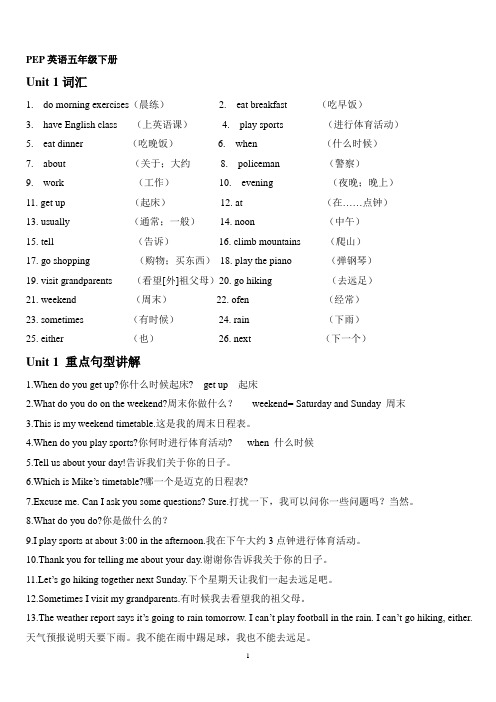
PEP英语五年级下册Unit 1词汇1. do morning exercises(晨练)2. eat breakfast (吃早饭)3. have English class (上英语课)4. play sports (进行体育活动)5. eat dinner (吃晚饭)6. when (什么时候)7. about (关于;大约8. policeman (警察)9. work (工作)10. evening (夜晚;晚上)11. get up (起床)12. at (在……点钟)13. usually (通常;一般)14. noon (中午)15. tell (告诉)16. climb mountains (爬山)17. go shopping (购物;买东西)18. play the piano (弹钢琴)19. visit grandparents (看望[外]祖父母)20. go hiking (去远足)21. weekend (周末)22. ofen (经常)23. sometimes (有时候)24. rain (下雨)25. either (也)26. next (下一个)Unit 1 重点句型讲解1.When do you get up?你什么时候起床? get up 起床2.What do you do on the weekend?周末你做什么?weekend= Saturday and Sunday 周末3.This is my weekend timetable.这是我的周末日程表。
4.When do you play sports?你何时进行体育活动? when 什么时候5.Tell us about your day!告诉我们关于你的日子。
6.Which is Mike’s timetable?哪一个是迈克的日程表?7.Excuse me. Can I ask you some questions? Sure.打扰一下,我可以问你一些问题吗?当然。
PEP小学五年级下册英语知识点总结-全册(最新最全)

PEP小学五年级下册英语知识点总结-全册(最新最全)PEP小学五年级下册英语知识点总结全册Unit 1: Daily RoutinesIn this unit。
we learn some main words and XXX。
Some of the main words are: do morning exercises。
eat breakfast。
have English class。
play sports。
eat dinner。
climb mountains。
go shopping。
play the piano。
visit grandparents。
and go hiking。
For example。
when we want to ask someone when they eat dinner。
we can say "When do you eat dinner?" and the answer can be "I eat dinner at 7:00 in the evening." Similarly。
we can ask "When do you get up?" and the answer can be "I usually get up at 12:00 at noon." We can also use some synonyms like have breakfast instead of eat breakfast。
have lunch instead of eat lunch。
and have dinner instead of eat dinner。
We can also use do sports instead of play sports。
and often instead of usually.Unit 2: Seasons and ActivitiesIn this unit。
PEP小学英语五年级下册各单元要点总结
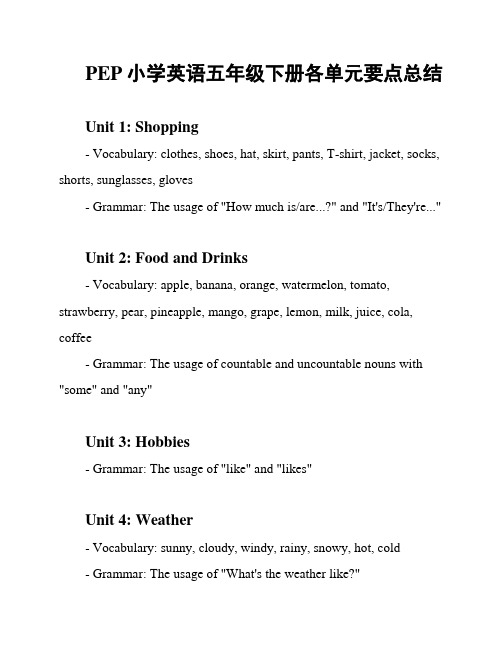
PEP小学英语五年级下册各单元要点总结Unit 1: Shopping- Vocabulary: clothes, shoes, hat, skirt, pants, T-shirt, jacket, socks, shorts, sunglasses, gloves- Grammar: The usage of "How much is/are...?" and "It's/They're..."Unit 2: Food and Drinks- Vocabulary: apple, banana, orange, watermelon, tomato, strawberry, pear, pineapple, mango, grape, lemon, milk, juice, cola, coffee- Grammar: The usage of countable and uncountable nouns with "some" and "any"Unit 3: Hobbies- Grammar: The usage of "like" and "likes"Unit 4: Weather- Vocabulary: sunny, cloudy, windy, rainy, snowy, hot, cold- Grammar: The usage of "What's the weather like?"Unit 5: Classroom- Vocabulary: desk, chair, blackboard, eraser, pencil, ruler, book, pen, bag, sharpener, glue, scissors- Grammar: The usage of prepositions "on", "in", and "under"Unit 6: Daily Routines- Vocabulary: get up, have breakfast, brush teeth, go to school, have lunch, do homework, have dinner, take a bath, go to bed- Grammar: The usage of present simple tense with daily routinesUnit 7: Jobs- Vocabulary: doctor, teacher, driver, police officer, firefighter, chef, engineer, artist, musician, journalist, scientist, astronaut- Grammar: The construction "What does he/she do?" and the usage of adjectives to describe jobsUnit 8: Animals- Vocabulary: dog, cat, bird, fish, rabbit, monkey, tiger, lion, elephant, panda, giraffe, snake, kangaroo- Grammar: The usage of "Can" to talk about abilitiesUnit 9: Festivals- Vocabulary: Spring Festival, Christmas, Thanksgiving, Easter, Halloween, Lantern Festival, Dragon Boat Festival, Mid-Autumn Festival, National Day- Grammar: The usage of "When is...?" and the construction "I like... because..."Unit 10: My City- Vocabulary: park, supermarket, hospital, school, post office, bank, library, restaurant, cinema, zoo, museum, airport, train station, subway - Grammar: The usage of prepositions "near", "next to", and "between"以上是PEP小学英语五年级下册各单元的要点总结。
pep五年级下册英语第五单元知识点

pep五年级下册英语第五单元知识点一、词汇部分五年级下册英语第五单元的词汇那可老重要啦!咱先说说“climbing”,发音是[ˈklaɪmɪŋ],意思就是“攀登、攀爬”。
比如说“He is climbing the tree.”,这人在爬树呢。
它经常和“be doing”结构一起用,表示正在进行的动作。
“eating”,发音[ˈiːtɪŋ],“吃”的意思。
“The cat is eating fish.”猫在吃鱼。
可以和不同的食物名词搭配。
“playing”,[ˈpleɪɪŋ],“玩”。
“They are playing football.”他们在踢足球。
常和各种游戏、运动名称搭配。
“jumping”,[ˈdʒʌmpɪŋ],“跳”。
“The rabbit is jumping.”兔子在跳。
可以用在描述各种动物或者人的跳跃动作中。
“drinking”,[ˈdrɪŋkɪŋ],“喝”。
“She is drinking water.”她在喝水。
和不同的饮品搭配。
“sleeping”,[ˈsliːpɪŋ],“睡觉”。
“The baby is sleeping.”宝宝在睡觉。
一般用于描述人或者动物在睡觉的状态。
这些词汇都是现在分词形式,表示正在进行的动作。
在学习的时候,可以多结合实际场景来记忆,比如在公园里看到小朋友在玩耍,就可以想到“playing”;看到小狗在喝水,就想到“drinking”。
这样学起来就容易多啦!而且还可以自己多造几个句子,加深对这些词汇的理解和掌握。
比如“I am eating an apple.”我在吃苹果。
“The birds are jumping on the branch.”鸟儿在树枝上跳。
怎么样,是不是很好记呢?二、句型结构本单元重点句型不少呢。
比如“Its tail is long.”这个句型就是在描述某物的特征。
“Its”表示“它的”,后面跟名词,再加上“is”和描述特征的形容词。
- 1、下载文档前请自行甄别文档内容的完整性,平台不提供额外的编辑、内容补充、找答案等附加服务。
- 2、"仅部分预览"的文档,不可在线预览部分如存在完整性等问题,可反馈申请退款(可完整预览的文档不适用该条件!)。
- 3、如文档侵犯您的权益,请联系客服反馈,我们会尽快为您处理(人工客服工作时间:9:00-18:30)。
新版PEP五年级英语下册各单元知识点一、重点词汇。
1.四会词汇:eat breakfast吃早饭have···class 上······课play sports 进行体育运动exercise 活动;运动do morning exercises做早操eat dinner吃晚饭clean my room 打扫我的房间go for a walk 散步go shopping 去买东西;购物dancing 跳舞;舞蹈take a dancing class 上舞蹈课2. 三会词汇:when 什么时候after 在(时间)后start 开始usually 通常地;惯常地Spain 西班牙late 晚;迟a.m. 午前;上午p.m. 午后;下午why 为什么shop 去买东西;购物work 工作last 上一个的;刚过去的sound 听起来好像also 还;也busy 忙的need 需要play 戏剧;剧本letter 信live 居住island 岛always 总是;一直cave 山洞;洞穴go swimming 去游泳win 获胜二、其他日常活动。
get up起床eat lunch吃午饭go to bed 上床睡觉wash my face洗脸wash my clothes 洗我的衣服watch TV看电视play ping-pong打乒乓球play the pipa弹琵琶go swimming 去游泳go running去跑步do homework 做作业do kung fu练武术play football踢足球play basketball打篮球三、频度副词。
always总是,一直(100%)usually通常(80%)often 经常(60%)sometimes(30%)有时四、疑问词。
when什么时候why 为什么五、重点句型。
1、询问别人什么时候做某事的句型及回答。
句型结构:问:When do you+动词短语原形+其他?(你/你们什么时候做某事?)答:I/We(+频度副词)+动词短语原形+at+具体时间(我/我们通常在几点做某事。
)例:问:When do you go to bed?(你什么时候上床睡觉?)答:I go to bed at 9:00p.m (我晚上9点上床睡觉。
)注意:当主语是第三人称单数(he,she,it,单个人名或单数名词)时,助动词do 要变成does,句型结构是:When does+主语(第三人称单数)+动词短语原形+其他?2、询问别人周末做什么的句型及回答。
句型结构:问:What do you do on the weekend?(你周末做什么?)答:I(+频度副词)+动词(短语)+其他。
例:问:What do you do on the weekend?(你周末做什么?)答:I usually read books. (我通常看书。
)注意:当主语是第三人称单数(he,she,it,单个人名或单数名词)时,助动词do 要变成does,句型结构是:What does+主语(第三人称单数)+do+on the weekend?六、四会句子:When do you finish class in the morning ? 你们上午的课到几点结束?We finish class at 1 o’clock . 我们一点钟结束上午的课。
What do you do on the weekend ? 你周末做什么?I often watch TV and play ping-pong with my father . 我经常看电视,也常和我爸爸一起打乒乓球。
七、语音:cl /kl/ clean clock class cleverpl /pl / plate eggplant please play一、重点词汇1. 四会:spring 春天summer 夏天autumn秋天winter 冬天season季节picnic 野餐go on a picnic 去野餐pick摘;采集pick apples摘苹果snowman雪人make a snowman 堆雪人go swimming去游泳2. 三会:which 哪一个best最;最高程度地snow 雪good job 做得好because 因为vacation 假期all 全;完全pink 粉色;粉色的lovely可爱的;美丽的leaf叶子(复数leaves)fall 落下;(美式)秋天paint 用颜料绘画二、其他1、形容天气的形容词hot 炎热的warm 暖和的rainy多雨的windy 多风的cold 寒冷的cool凉爽的sunny晴朗的cloudy 多云的snowy下雪的2、由go构成的活动短语go swimming去游泳go shopping去购物go boating去划船go skating去滑冰go hiking去远足go fishing去钓鱼三、重点句型1、询问别人天气怎么样的句型及回答。
句型结构:问:What’s the weather like+时间+地点?(······天气怎么样?)答:It’s+表示天气的形容词例:问:What’s the weather like in winter in Beijing?(北京冬天的天气怎么样)答:It’s cold and windy.(有风而且寒冷。
)2、询问别人最喜欢的季节句型及回答。
句型结构:问:Which season do you like best? (你最喜欢的季节是哪一个?)答:I like+季节+best或直接说季节名称。
同义句还有:What’s your favourite season?3、询问别人喜欢某个季节的原因的句型及回答。
句型结构:问:Why do you like+季节名称?或直接用“Why”来提问。
答:一般要用“because”引导的句子来说明理由,可以从天气相关的活动等方面来说。
例:问:Why do you like spring?(你为什么喜欢春天?)答:Because I can fly kites.(因为我能放风筝。
)问:Why do you like summer?(你为什么喜欢夏天?)答:Because I can go swimming everyday.(因为我每天都能去游泳。
)问:Why do you like autumn?(你为什么喜欢秋天?)答:Because the weather is cool.(因为天气凉爽。
)问:Why do you like winter?(你为什么喜欢冬天?)答:Because I can make a snowman.(因为我能堆雪人。
)四、四会句子:Which season do you like best , Mike ? 迈克,你最喜欢哪个季节?Winter . 冬天。
Why ?为什么?Because I like summer vacation ! 因为我喜欢暑假!五、语音:br /br/ brown library brother umbrellagr /gr/ green grapes grandpa grow一、重点词汇1.四会:January(Jan.)一月February(Feb.)二月March(Mar.)三月April(Apr.)四月May五月June(Jun.)六月July(Jul.)七月August(Aug.)八月September (Sept.)九月October(Oct.)十月November(Nov.) 十一月December(Dec.)十二月2. 三会:few 不多;很少 a few 一些thing 事情meet 聚会;开会sports meet 运动会Easter复活节trip 旅行year 年plant 种植contest 比赛;竞赛the Great Wall 长城national 国家的National Day 国庆日American 美国的Thanksgiving 感恩节Christmas 圣诞节holiday 假日;节日game 游戏roll 滚动look for 寻找chocolate 巧克力bunny (用作儿语)兔子RSVP (尤用于请柬)请赐复by在...... 之前注意:1、月份的首字母一定要大写。
2、May没有缩写形式,September的缩写形式是“Sept.”,其他月份单词的缩写形式都是有单词的前三个字母加“·”构成。
3、月份的缩写形式不用在句子中,只能单独使用。
4、表示“在几月”时,要在月份单词前面加介词in, 但在几月几日用on。
二、常用节假日名称。
New Year’s Day元旦(1.1)Tree Planting Day 植树节(3.12)Easter 复活节April Fool’s Day愚人节(4.1)May Day 劳动节(5.1)Mother’s Day母亲节(每年五月的第二个星期天)Children’s Day 儿童节(6.1)Father’s Day父亲节(每年六月的第三个星期天)Teachers’ Day教师节(9.10)China’s National Day国庆节(10.1)Mid-Autumn Day 中秋节(农历八月十五)Thanksgiving Day 感恩节(11月第4个周四)Christmas圣诞节(12.25)summer vacation暑假winter vacation寒假三、活动名称sports meet 运动会Easter party 复活节聚会school trip 学校旅行Chinese test 语文测试singing contest歌咏比赛birthday party生日聚会四、介词in 、on、at的用法。
1、in后面+上午/下午/晚上/月份/季节/年份。
如:in the morning, in April, in winter, in 2015.2、on的后面+具体的某一天。
如:on Monday, on April 3rd, on Friday morning.3、at后面+具体的时间点或与其他词构成固定搭配。
如:at six o’clock, at 12:30,at noon.五、重点句型。
1、问答某个活动或节日在几月份的句型及回答。
句型结构:问:When is+活动或节日名称?答:It’s in+月份。
例:问:When is Christmas?(圣诞节在什么时候?)答:It’s in December.(在十二月。
